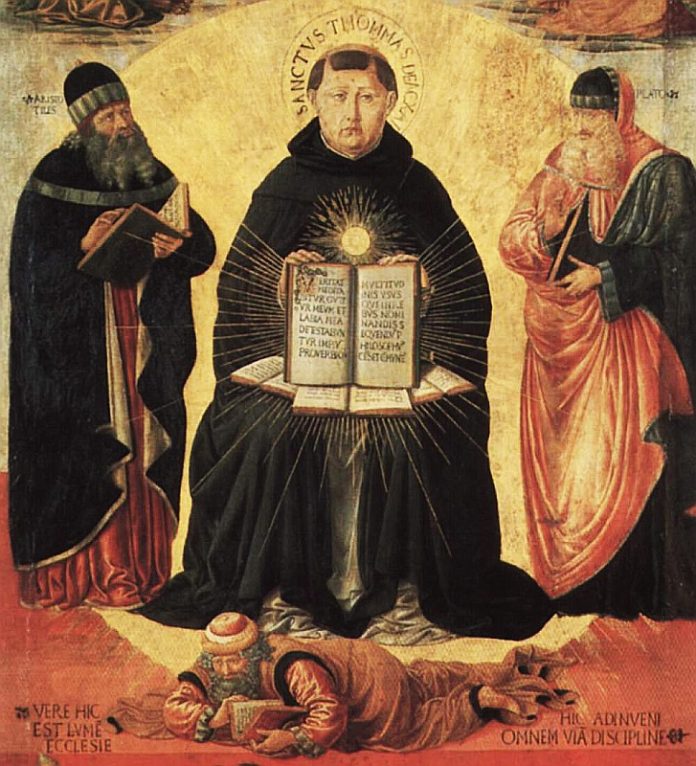Saint Thomas Aquinas died on this day, March 7, 1274, at the Cistercian monastery of Fossanuova in Italy, between Naples and Rome (where there is now a street named after him) on his way to the Second Council of Lyons, in southwestern France. His death, like his life, was eminently holy and simple, offering his soul to God in his 49th year while commenting on the Song of Songs. This day was his feast (and still is in the usus antiquior) until the revisions after Vatican II, when January 28th was chosen (outside of Lent), the commemoration of the transfer of the great saint’s relics to Toulouse.
We could use a lot more of the clarity, precision and, yes, the humble simplicity of Thomas, not just in theology, but in life in general. That is why he is the patron saint of students, and mentioned by name in the Vatican II document on education, Gravissimum Educationis, especially of the higher variety, that is, university studies. Alas, most ‘university’ students (and I use those scare quotes for a reason) not know even who Thomas is. And we wonder why we’re in the mess we’re in.
So pick up your Summa today (if you don’t have one, it is all found here), and peruse an article or two. Flannery O’Connnor mentioned that she read one article from Thomas before retiring for the evening, keeping her mind and soul sharp and immersed in truth, to which Thomas devoted his brief, but intense, life, entirely given to the sacraments, prayer, writing and teaching. Would that more would do at least a little of the same.
A reader yesterday was quite upset about some of my comments on restricting the privilege of voting, especially to those of ‘welfare’, and I did emend the article in light of her feedback. My point was not that who depended on the government were ‘unworthy’ to vote by some debilitating factor (the ‘dumbing down’ in the title was in reference specifically to the sixteen-year olds, with regard to their maturity), but, rather, that along along with certain privileges or circumstances, goes the renouncing of some others. Those who receive their living from the government should have at least some restrictions on voting to increase and maintain this living, offered through everyone else’s expense (keeping mind the government has no money, but only the power to garnish money from those working to produce wealth). To offer but one egregious example, parliamentarians should not be allowed to vote on their own pay raises. If a given government can maintain its grip on power by financial emoluments and handouts, again at the expense of others, well, something should be done. Socialism, the intrusion of the State into more and more of our lives, bank accounts, family lives, education and so on and on, is a grave and pernicious evil, that must be stopped, or our society, as we know it, simply will not survive.
What should be done to stop this regress I know fully not; I have some thoughts, and we should at least open the debate, for the status quo is unsustainable. And while we’re at it, don’t give the vote to sixteen year olds. From my humble standpoint, I’m with Aristotle: most men don’t really reach maturity until they’re 40. Although such a voting age may well help matters, it has as much chance of flying as the mythical winged pigs.
Saint Thomas Aquinas, ora pro nobis!

